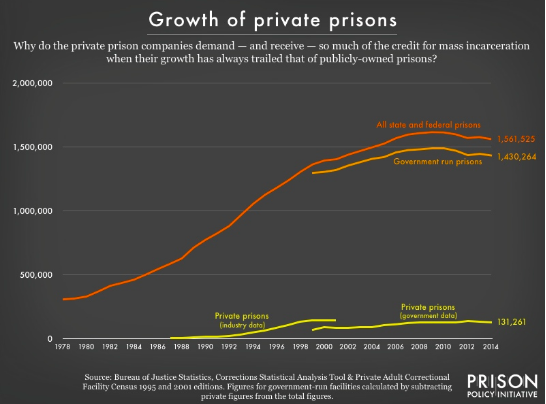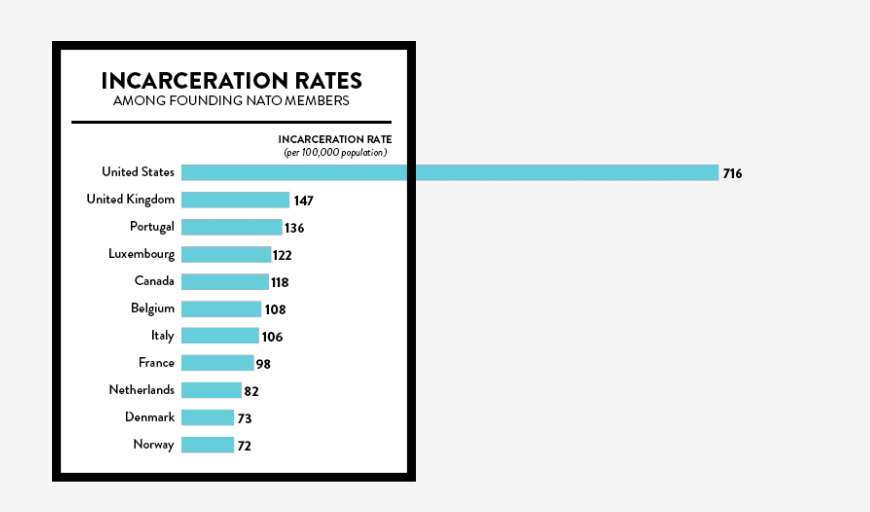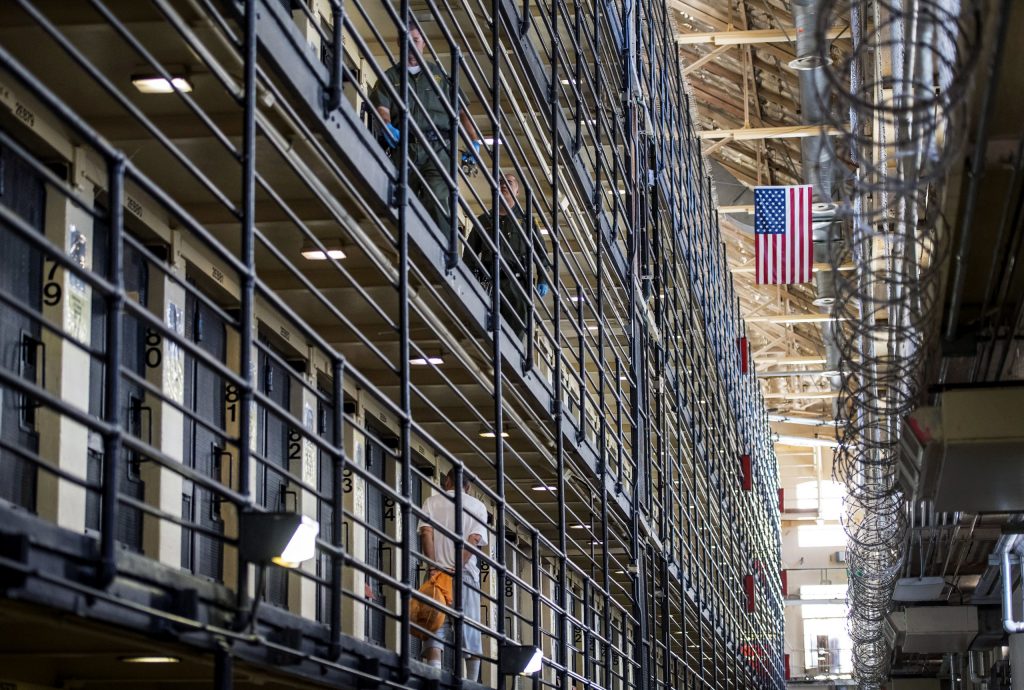Yesterday, Joe Biden announced a “racial equity” plan, paying lip service to George Floyd, the unarmed Black man whose murder sparked a national and international uprising against police brutality and racism. Biden claims the plan is a step toward “ending institutional racism.” One of his primary initiatives is an executive order that directs the Department of Justice not to renew contracts with private prisons that house federal inmates. This largely returns to a policy adopted by the Obama administration in August 2016 — an executive order issued only a few months before he ended his eight years as president.
“To decrease incarceration levels, we must reduce profit-based incentives to incarcerate by phasing out the federal government’s reliance on privately operated criminal detention facilities,” Biden wrote in the order. Of course, Biden holds much of the responsibility for the huge increase in mass incarceration resulting from his 1994 Crime Bill, which created tougher sentencing laws, increased police funding, and vastly expanded the already massive U.S. prison system. Due in part to Biden’s policies, the United States has 25 percent of the total incarcerated population of the world, with Black people incarcerated at five times the rate of white people.
In words dripping with hypocrisy, Biden added, “We’ve never fully lived up to the founding principles of this nation … that all people are created equal and have a right to be treated equally throughout their lives …Now’s the time to act.” Of course, these “founding principles” were written by enslavers and capitalists who wanted to maintain their power.
Prisons have become a central point of activism over the past few years. Incarcerated people have gone on strike against meager wages paid for their labor, solitary confinement that often relegates prisoners to years of minimal human contact, and onerous job training and education programs. People have demanded to #FreeThemAll throughout the coronavirus quarantine, as well as that #NoNewJails be built and for Rikers Island prison in New York City be closed. One of the central aspects of the Black Lives Matter movement has been to question not only police budgets but also the massive prison-industrial complex, which is one of the pillars of institutional racism in the United States.
As a result of these massive struggles, Biden has been forced to make some concessions, including this executive order. It is part of the Democratic Party project of painting racism as a “bug” of the U.S. system — one embodied by Donald Trump and the Republicans rather than a central feature of the bipartisan regime, the U.S. constitution, and global capitalism.
Private prisons are a disgusting feature of U.S. capitalism, which seeks to privatize and make profit from everything from schools to water to prisons. The private prison industry rakes in billions of dollars through federal contracts. As Abolish Private Prisons explains,
Private prisons are businesses. Their highest priority is profit and they thrive on mass incarceration. The stock values of publicly traded private prison corporations increase in value as they project higher profitability in the operation of their facilities, which comes from incarcerating more people.
Private prisons are the most obvious ways that private corporations profit off of putting human beings in cages. And yes, private prisons (and the entire prison system) should end.
But this executive order doesn’t end private prisons. Nor is Biden eliminating the profit motive in the massive U.S. prison-industrial complex. He talks the big talk, but this is a small, primarily symbolic, concession.
Ruth Wilson Gilmore argues that focusing on private prisons is how “the ‘new realists’ achieve their dominance by defining the problem as narrowly as possible in order to produce solutions that, on closer examination will change little.” So, what remains in place despite Biden’s executive order?
Ending Private Prisons?
While Biden talked about ending systemic racism and keeping “America’s promise” to people of color, this is at best a very very tepid place to start. People held in private prisons represent a mere 9 percent of the federal prison population — and only 0.6 percent of the 2.3 million people incarcerated in U.S. prisons and jails. The executive order leaves the vast majority of the prison system entirely intact.

Further, as Lauren-Brooke Eisen, director of the justice program at the Brennan Center for Justice at New York University explained, “Many of those contracts are 10 year contracts, and some of them were recently signed.” In other words, by the time many of these contracts expire, the political winds might have changed and we could return to private prisons.
All of this completely ignores the other system of private prisons in the United States: immigrant detention centers, which are allowed to continue to be within private prisons. In fact, 81 percent of immigrants are held in private detention camps in horrendous conditions. Just a few months ago, the forced hysterectomies of immigrant women were uncovered in the facilities of private corporation La Salle Corrections. Throughout the past decade, trans* women have died in private prisons at an alarming rate, including Roxanna Hernandez and Victoria Arellano.
The expansion of immigrant detention centers exploded during the Obama administration. Trump went even further; in 2019, his administration more than doubled spending on GEO Group, a big player in the for-profit incarceration industry. Most of the $595 million went to fund immigrant detention camps. Biden isn’t touching these concentration camps, which continue to detain and abuse immigrants, including children.
Private Profits in Prisons
Further, Biden’s executive order does not do away with private profits in public prisons — not by a long shot. Michelle Alexander explains the multitude of prison profiteers, including “phone companies that gouge families of prisoners by charging them exorbitant rates to communicate with loved ones; gun manufacturers that sell taser rifles, and pistols to prison security guards and police; private healthcare providers contracted by the state to provide (rather abysmal) healthcare to prisoners”; and more. Corizon Correctional Healthcare, the largest prison medical provider, takes in $1.5 billion a year. Private construction companies are hired to build prisons: prison construction brought in an average of $2.8 billion per year from 2001 to 2012. Private companies provide prison food that is sometimes so inedible that lawsuits result. For example, Aramark Correctional Services, one of the largest food providers for prisons, reportedly “served food tainted by maggots … rotten meat … food pulled from the garbage [and] food on which rats nibbled.”
Private corporations of all sorts have contracts to maintain the U.S. prison behemoth. They provide sub-par services to prisons and rake in massive profits — and they aren’t going anywhere.
Imprisoned people also provide private corporations with profits through exploitation of their especially low-wage labor. The 13th Amendment, which abolished slavery at the end of the Civil War, made an exception for incarcerated people. When a person is incarcerated, enslavement is justified. And so, imprisoned people provide corporations with low-wage labor and sometimes even labor for free. Sometimes imprisoned people work for the state; New York State’s incarcerated people were forced to produce hand sanitizer at the start of the pandemic — which they weren’t allowed to use themselves. Others work on “prison farms” that grow crops sold to the public by the prison itself. Mississippi State Penitentiary farm, for example, had a value of production totaling $1.3 million in 2012.
Further, as the Prison Policy Initiative explains, state and local governments sometimes use prisons to pad their own budgets. Take Oklahoma, for example, where the Prison Policy Initiative explains that “local sheriffs receive $27 per day” for each person they hold for the state prison system, which makes up about 7 percent of some counties’ budgets.
Clearly, there’s a huge incentive to fill the prisons.
An Executive Order that Doesn’t Actually Free Anyone
Perhaps most important is that Biden’s executive order does not free a single person from prison. The United States has, by far, the highest imprisoned population in the world, with Black and Latinx people disproportionately represented. The US makes up about 4 percent of the global population, but has about a quarter of all the world’s imprisoned people.

Biden, the author of the infamous Crime Bill and whose administration with Obama helped vastly expand the system of immigrant detention centers, now wants us to forget his own legacy. But he’s no warrior for racial justice. His executive order is a weak half-measure, at best, that keeps millions of people locked up and keeps corporations profiting from this system. As the Prison Policy Institute argues, “The beneficiaries of public prison largely love it when private prisons get all of the attention. The more the public stays focused on the owners of private prisons, the less the public is questioning what would happen if the government nationalized the private prisons and ran every facility itself: Either way, we’d still have the largest prison system in the world.”
Huge numbers of people imprisoned are there for low-level drug charges or minor parole violations. The prison system isn’t about keeping anyone safer; it’s about controlling people of color and poor people, as well as maintaining another revenue stream so private corporations can rake in huge profits.
Prisons are a central mechanism of the capitalist state. Like the police, they exist to serve and defend the interests and profits of the capitalist class. To fulfill the promise of equality and justice for all, the racist prison system and the racist police — pillars of the capitalist system and of a U.S. empire built on racism and the enslavement of African people — would have to be pulled down, not “reformed.”
It’s not that the United States is failing to live up to its promise. This is what the United States was built to do. To end this immensely profitable prison system, we cannot rely on Joe Biden or the Democrats, who have always defended and expanded that very system. To end the racist prison system that helps capitalism function, we must organize to end the capitalist system itself.











